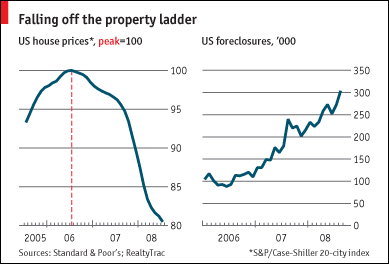Possible long-term solutions to fix mortgage woes
The Economist published this article in their weekly “Economics Focus” section back in October and I’m just getting around to blogging about it. This section of the magazine deals with theoretical economics so it’s always interesting to see what the best minds in the field are proposing to help fix our current economic problems.
In this edition the subject matter is mortgages. Specifically, various economists suggest fixes for the problem of foreclosures.
Let’s first define the problem:
The problem is that as foreclosures increase, the stock of housing inventory rises, pushing home values lower. As home values go down, it prompts more homeowner’s to enter foreclosure because their is no economic incentive for them to keep current on their home. It becomes a vicious cycle that is illustrated in the chart below. As foreclosures increase, property values decrease, causing foreclosures to increase even more……
The proposed solutions:
*Make mortgage a “recourse” loan. Currently mortgages are “non-recourse” which means when a bank forecloses on a home and is only able to recover a fraction of the original loan the borrower DOES NOT have to pay back the difference. Under a “recourse” arrangement the borrower would still be personally liable for the difference between the loan amount. This would increase the incentive for borrowers to avoid foreclosure.
*Another economist suggests adding a clause to future mortgage agreements that would automatically trigger a principal reduction on the loan amount when the value of the home decreases by a certain amount. For example, under this clause if your home decreases in value by 20%, your loan principal would also decrease by 20%. This arrangement would protect the homeowner’s equity position and therefore create an incentive for them to remain in their home. The trade off is that the homeowner would need to share in the equuity appreciation in the future so that the lender is paid back.
Both of these theories are interesting. We’ll have to wait and see if any take shape in the future.
